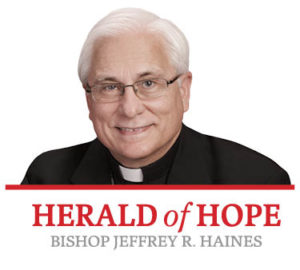Herald of Hope
This has not been an easy time for baseball fans. During the past year, we have experienced the death of 10 members of the Hall of Fame, including star players near and dear to the people of the city of Milwaukee and the state of Wisconsin, Henry Aaron and Don Sutton.
Included in that list of obituaries is a well-known baseball manager named Tommy Lasorda, who passed away on Jan. 7. Lasorda served as the skipper of the Los Angeles Dodgers from 1976-96. His credentials for membership in the hallowed halls of Cooperstown are impeccable. He amassed a total of 1,599 wins, four National League Pennants and two victories in the World Series, 1981 and 1988. Yet, the truth be told, I must confess that I should not be praising Tommy Lasorda nor writing a newspaper article about him. That is because I am a die-hard fan of the Cincinnati Reds’ “Big Red Machine,” featuring Pete Rose, Joe Morgan, Tony Perez and Johnny Bench. For many years, the Dodgers were the mortal enemies of the Reds.
Yet, I humbly admit that I have a conversion story to tell in relation to Lasorda, and it is a rather unusual tale. It happened in the unlikely location of Nashville, Tennessee. An avowed adherent of the country and western sound, I was visiting Music City to enjoy the Grand Ole Opry and shows on its many stages in classic honky tonks. One afternoon, I was enjoying a Gray Line Tour of the homes of the country superstars when we were driving by a pleasant but less than opulent residence. The tour guide announced that this was not the site of a house owned by a famous singer. Rather, the guide said that the building was a convent of the Sisters of Mercy, which had been built with the fundraising assistance of popular baseball manager Tommy Lasorda. Being no fan of the “Dodger blue,” I was incredulous regarding the philanthropy of Lasorda. That is, until I spent the next evening attending a music club called the Nashville Palace. There, among the photographs of well-known Opry stars hanging on the walls, was a picture of the Dodgers manager. I asked the waitress about the reason for the presence of Lasorda’s image, and she told me that “Tommy” is a frequent visitor to the city, known for his love of country music and his generosity to various Catholic charities, particularly the Sisters of Mercy.
Aghast at the confirmation of the news about my detested baseball opponent, I set out to research the veracity of his alleged devotion to the Catholic faith. Much to my surprise, Lasorda was revealed to be not only Catholic in background but – even more importantly – Catholic in dedication and practice. I learned that he grew up attending the Italian Catholic Parish in his hometown of Norristown, Pennsylvania. Moreover, he attributes much of his success to the formation he received from his teachers there, in particular, his seventh-grade instructor, Sister Immaculata, who once told him, “Thomas, a lot of them think you are rowdy, think you’re a bad boy. But, I don’t think you’re a bad boy. I think you’ve got a lot of good in you and someday you’re going to make people proud of you.”
My further research proved that Sister’s prediction had come true. I learned that “Thomas” truly was a sincere Catholic. His office at Dodger Stadium included an autographed picture of Mother Teresa of Calcutta. And, he regularly invited a priest to the locker room before every Sunday game to celebrate Mass for the Catholic members of the team. Nor was Lasorda shy about giving witness to his faith, saying, “I love my faith. I practice my faith. It’s helped me a great deal throughout my lifetime.” When once asked about advice regarding his religion, he responded, “I think if you have faith in God, then God will do a lot of things for you. Go to Mass, and go to confession and confess your sins. That’s what it takes to be a good Catholic.” Lasorda’s testimony apparently was effective, as he often was asked to serve as a godparent or sponsor for players and/or their children who were receiving the Sacraments.
It was in his support for noble Catholic causes, however, where the faith of Lasorda truly shined. He often was asked to serve as an emcee or guest speaker for fundraising dinners, like a booster club benefit for the Seton Catholic Prep School in Chandler, Arizona. He also supported the Carmelite Sisters in Guerra, Dominican Republic, where the Programa Comunitarion Futuro Vivo Escuela provides a sound education, with vocational training and computer classes for 600 youth. In fact, six of the graduates of this school have gone on to join religious communities. About such charity, Lasorda commented, “I believe that God puts you on Earth for a reason. I think he put me on Earth to help people, to do everything I can to help.”
It has been difficult for me, a loyal aficionado of the Big Red Machine, to divulge that I have written such a glowing tribute to someone who claims to bleed blood that is “Dodger blue” and refers to God as the “Big Dodger in the Sky.” Yet, perhaps absolution can be found in yet one more story, which gives assent to complimenting Tommy Lasorda. The story involves Lasorda being invited to a special birthday party in Lakeland, Florida, to honor one of his friends and help raise money for the Saint Joseph Catholic School Foundation. The honoree that evening was celebrating his 60th birthday. His name was George Anderson – George “Sparky” Anderson, the former manager of the Cincinnati Reds. If Tommy Lasorda was OK with Sparky, I guess it is all right for me to praise him, too.

